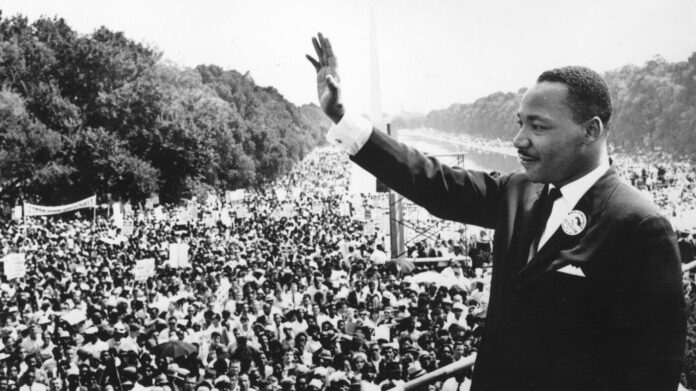
Civil Rights leader and American hero Dr. Martin Luther King Jr changed the world, and his legacy still continues. In a time when segregation was all that America knew, King keep his dream alive and brought the nation together. Today, we remember Dr. King and his timeline of impact he had on America.
Timeline via USA Today
1929
Jan. 15: Michael King is born in Atlanta. His father changes the boy’s name, as well as his own, to Martin Luther King several years later.
1944
Sept. 20: King enrolls at Morehouse College after passing the entrance exam at age 15.
1946
Aug. 6: The Atlanta Constitutionpublishes a letter to the editor from King supporting minority rights.
1954
Sept. 1: King begins his pastorate at Dexter Avenue Baptist Church in Montgomery, Ala.
1957
Jan. 10: King is named chairman of what becomes the Southern Christian Leadership Conference (SCLC).
Feb. 18: King appears on the cover of Time magazine.
May 17: King delivers his first national address, “Give Us the Ballot,” at the Prayer Pilgrimage for Freedom at the Lincoln Memorial in Washington.
1960
Feb. 1: King moves from Montgomery to Atlanta to focus on the civil rights struggle.
Oct. 19: King is arrested at a sit-in demonstration at an Atlanta department store. He is sentenced to four months of hard labor — for violating a suspended sentence in a 1956 traffic violation. He is released on $2,000 bond.
1961
Dec. 16: King and hundreds of others are arrested in desegregation campaign in Albany, Ga.
1962
July 27: King is arrested at a prayer vigil in Albany and spends two weeks in jail. He leaves Aug. 10.
1963
April 16: After being arrested for ignoring an Alabama state court injunction against demonstrations, King writes his famous Letter from a Birmingham Jail, a defense of nonviolent resistance to racism.
Aug. 28: King delivers his “I Have a Dream” speech at the Lincoln Memorial as more than 200,000 demonstrators take part in the March on Washington for Jobs and Freedom.
1964
Jan. 3: Time magazine names King “Man of the Year” for 1963.
Dec. 10: King wins Nobel Peace Prize.
1965
March 17-25: After voting rights marchers are attacked and beaten by police in Selma, Ala., King peacefully leads civil rights marchers from Selma to Montgomery.
1967
April 4: In speech at a New York City church, King demands U.S. make greater effort to end Vietnam War.
Dec. 4: King unveils plans for a Poor People’s Campaign, a mass civil disobedience protest, for the spring in Washington. It was intended as an expansion of his civil rights activities into the area of economic rights.
April 3: King returns to Memphis, intending to lead a peaceful march. At an evening rally, he delivers his final speech, “I’ve Been to the Mountaintop.”
April 4: King is shot and killed on the balcony of the Lorraine Motel.
April 9: King is buried in Atlanta.








